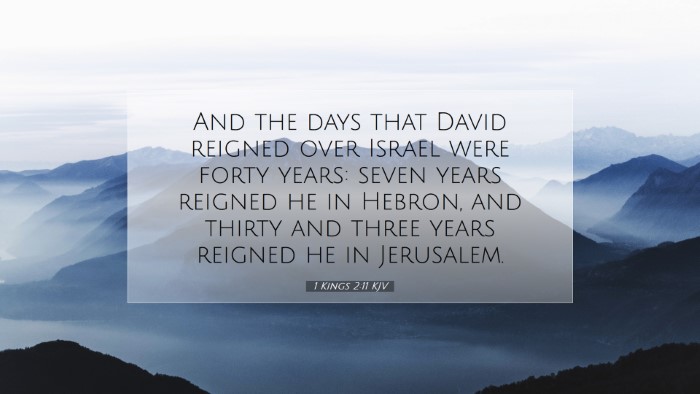Commentary on 1 Kings 2:11
Verse: “And the days that David reigned over Israel were forty years: seven years reigned he in Hebron, and thirty and three years reigned he in Jerusalem.”
Introduction
This verse presents a pivotal moment in the narrative of Israel’s monarchy. It encapsulates the reign of David, one of the most significant figures in biblical history, evidencing both his tenure and the division of his reign between Hebron and Jerusalem. The context underscores the transition of leadership and sets the stage for Solomon's succession. A survey of various public domain commentaries reveals profound insights into this verse's theological and historical implications.
Theological Reflections
The reign of David is a testament to God’s faithfulness and the fulfillment of His promises. The Scriptures depict David not only as a king but as a man after God's own heart (1 Samuel 13:14). This verse highlights the completion of David’s rule, establishing a timeline that offers deep theological significance.
- God's Sovereignty: The exact periods mentioned reflect God's orchestration of historical timelines, emphasizing His sovereign control over Israel's monarchy.
- Completion: The mention of forty years signifies a complete reign. Biblical numbers often carry symbolic weight; here, forty represents a period of testing and preparation, framing David’s life as one ripe with divine purpose.
- Transition: The delineation between Hebron and Jerusalem signifies not just geographical shifts but spiritual ones as well, marking the transition from a tribal confederation to a unified kingdom.
Insights from Matthew Henry
Matthew Henry emphasizes the importance of this verse in establishing the narrative of David's reign. He notes that the division of David's reign into two distinct periods serves several purposes. It demonstrates:
- God’s providential care in guiding His people through various phases.
- The character development of David, elucidating how different challenges shaped his kingship.
- The significance of Jerusalem, both politically and spiritually, as the heart of Israel.
Albert Barnes' Commentary
Albert Barnes further expounds on the significance of the forty-year reign, associating it with the historical context of ancient monarchies. Barnes suggests:
- Such a length of reign indicates stability and the establishment of the Davidic line.
- Hebron served as a place of initial leadership, while Jerusalem represented the culmination of David’s efforts, portraying a journey from initial struggle to ultimate success.
Adam Clarke’s Insights
Adam Clarke provides an in-depth analysis of David's reign with particular emphasis on its spiritual implications. He notes that:
- This passage affirms God’s covenant promises to David, which are fulfilled through the establishment of a lasting dynasty.
- The timeline of David's reign serves as a prophetic setup for the coming of the Messiah, drawing connections between David’s rule and the promise of a messianic king.
Practical Applications
The implications of 1 Kings 2:11 extend beyond historical recount. For pastors, theologians, and students, several applications emerge:
- Leadership Transition: The verse offers insights into the nature of leadership transitions, emphasizing the importance of preparation and God's hand in such moments.
- Faithfulness in Leadership: David's reign serves as a model of faithfulness for spiritual leaders, illustrating the importance of relying on God throughout one's tenure.
- Hope in God’s Promises: The assurance that God fulfills His promises can be a source of hope for individuals and congregations, especially during times of uncertainty.
Conclusion
In sum, 1 Kings 2:11 is rich with historical, theological, and practical implications. It not only marks the conclusion of a significant reign but also heralds the beginning of Solomon's leadership, thus continuing the divine narrative of Israel's history. As we reflect on this verse, we are reminded of God's faithfulness, the importance of righteous leadership, and the enduring hope found in His promises.


